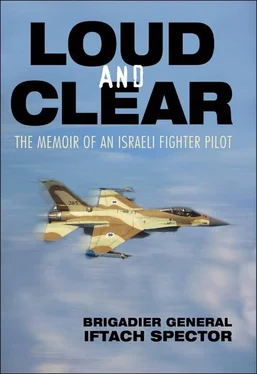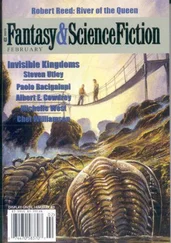We talked about the forthcoming operation. When I told Raful that Ivry wouldn’t let me go to Baghdad and requested his help, he cut me off rudely.
“Spector, you’re trying to become General Popsky again? Forget it. This is not your own private mission.”
I pointed to his left hand, where he was missing two fingers. I said, “Everything is personal, Raful.”
He was stunned, then got it.
“Hah!”
I HAVE TO EXPLAIN THAT. In this conversation I relied on something that had happened a few years before, when I was chief of operations of the air force. The deputy chief of staff, Rafael Eitan, Raful, asked me to his office. When I entered he was sitting there alone, writing. When he noticed me at the door he looked up and demanded without any preamble, “Give me a proposal on what to do about the plague of accidents in the IDF.”
This is how Raful was, right at you straight and simple.
“Right now?”
“Right now.” Raful didn’t like to wait for reports.
Well, prevention of training accidents was an issue I was interested in. I was very proud of the fact that after four years of commanding fighter squadrons, in two wars, I had lost not a single man. I began elaborating on this, but Raful waved me off. He was a peasant, an artisan. He did carpentry at home, and on weekends he sawed planks and made furniture. He needed something physical.
On his desk among the papers lay a fancy dagger. I bent forward, took the dagger, and stuck it forcefully into the top of the desk. Raful looked at me and then at his wounded desk, and then at me again, his black carpenter’s brows rising in amazement.
“If you really want to stop accidents right away,” I told him, “whenever you are told about an accident, stab your hand or thigh with this dagger. You’ll see that this will get the desired effect very quickly.” I got up to leave.
I stopped in the doorway. He was looking at me. I added, “Accidents continue to happen because the commanders see them as fender benders. Nothing will change until they hurt you personally.”
He grinned at me and waved his hand in dismissal.
Not long after, I heard that Raful had injured himself in his carpentry shop. I came to his office to see. Again the deputy chief of the IDF sat alone in his room, writing, his bandaged left hand resting on the paper as a weight. He gave me a look that said, “Well?”
I pointed at the bandage and he said, “I got careless with the big saw and cut off two fingers. An accident. It happens.”
“And what happened afterward?” I asked.
“Ah, nothing.” He grinned. “I threw the fingers to the dog.” Raful was not very softhearted, even with himself.
I couldn’t keep from laughing. He already wanted to get back to his papers.
“Does it hurt?” I asked.
“Quite a bit,” he admitted. “From now on I’ll be more careful.”
“As I said, it is all personal.”
AS I HAD EXPECTED, RAFUL approved my request to fly the Tammuz mission.
To nail it down, so he wouldn’t backtrack when Ivry complained, I equipped him with a parable. “When you are the division commander and two of your regiments go to fight,” I asked him, “where should you be?” Raful was a real fighter and excellent field commander.
“What a question!” he barked at me. There was no way he could answer differently. The rain was letting up, and he was getting restless. Getting out of his car, he summed up. “Well,” he said, “so you’ll be flight leader.”
“No.”
“What?” he almost roared at me. “Now, Spector, I really don’t know what you want!”
I had no intention of taking command of the operation, although Raful was amazed at and perhaps disappointed by my decision. I explained that I wanted to fly the tail of the formation. I chose to fly as number six or seven of the eight.
“But why?”
I told him. I knew that my strength was not in flying the F-16, for as a base commander I couldn’t train enough in it. For sure my two squadron commanders, Raz and Nahumi, were better in the F-16 than I was. The meaning of my flying had nothing to do with leading the mission. Deep in my heart I was expecting the unforeseen, and believed that maturity and plenty of experience were called for. I could imagine so many uncertainties, bad weather on the way in or over the target. MiGs might suddenly show up. One of us might fall by the wayside for technical or other reasons. I was sure hard decisions were in the offing. There were many possible things that could happen to eight fighters a thousand kilometers away from home, crossing three enemy countries.
I was sure something unexpected would happen, and there and then, Raz would need someone like me at his side. Just a word, even a nod might suffice. Oh, how I had needed such a person once above the clouds over Damascus.
Ironically, the attack on Tammuz went like silk, nothing went wrong, and nothing was needed from me.
AND NOW THE TIME HAS COME for me to reveal my own secret, one I have kept inside for exactly twenty years.
“As everybody here knows,” I said, “I missed the target. I was the only one of us whose bombs didn’t hit Tammuz. I was very disappointed that I missed, but that’s not the important part. The important part is that I avoided telling the truth about the reason for that miss. Now you shall be the first to hear it.” I saw them perk up, and everyone was watching me.
“On the pull-up for the attack,” I told them, “I was blind—blacked out.
“I was not at the peak of health then. A few months before, I had begun having asthmatic symptoms. I was in denial, didn’t believe the doctors, and convinced myself this was just a ‘passing something.’ I was taking pills to ease my breathing at night, and only later learned they thinned the blood and lowered my resistance to g-force.”
“Until this flight to Tammuz, I had done my flight training with no physical difficulty, so I didn’t expect what was coming. Then, on the night before the mission, I had breathing difficulties and couldn’t fall asleep. After takeoff the next day I felt very tired, and throughout the flight to Iraq I kept nodding off.”
I remember this long flight as an unending nightmare. It dragged on for more than ninety minutes, eight aircraft wobbling slowly along at low altitude, saving every liter of fuel. First I felt okay, but after ten minutes, when we crossed the spectacular Edom Mountain ridge close to Eilat, the view turned flat and monotonous and I began to feel tired. Gray, barren expanses crawled along, cut at times by wide, dry wadis, and it went on seemingly forever. My aircraft crept along on its own. Lying on my back, strapped in the comfortable armchair of the F-16, I caught myself time and again dozing off. It was awful. I tried slapping myself the way I did that night in 1973 over the Red Sea, but I couldn’t overcome it. Simply, there wasn’t any danger in the air, all around was just nothing, and we were gliding through a gray, hazy, totally empty nowhere. I didn’t even need to navigate to stay awake; the goddamn F-16 did everything on its own. I knew it was bad. I took off my gloves and pinched my thighs with my fingernails. I tried to move around in the seat, to inhale deeply, and still my head fell, rose, and fell again. From that whole trip I can visually recall only some low, hilly crests that appeared from nowhere and passed slowly beneath me, then were lost forever into another nowhere.
At last, when we had crossed into Iraq, jettisoned our external fuel tanks, and turned onto the last leg approaching the target, I woke up. When we accelerated over the fields of the delta of the Euphrates, I was again alive and alert, but an ugly flaw lay curled inside me. When the time to pull up came, I pulled up, and to my surprise found myself totally blind. I didn’t lose consciousness, my brain continued working all right, but I was climbing fast and all I could see before my eyes was darkness.
Читать дальше












